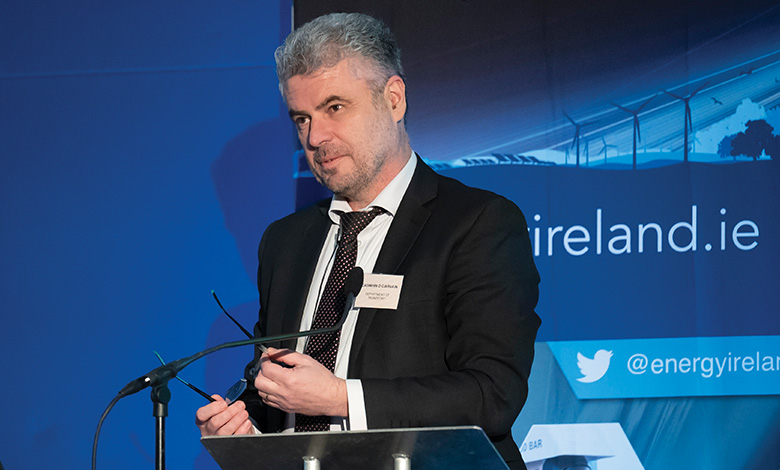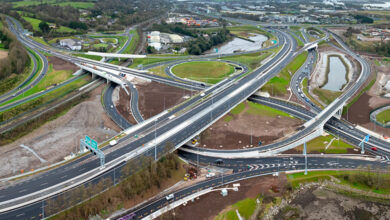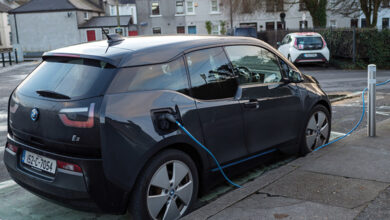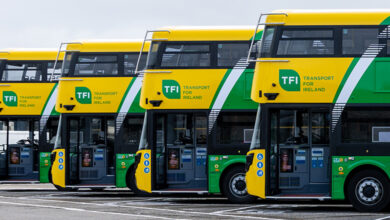Developing alternative fuels infrastructure

Caoimhín Ó Ciaruáin, Assistant Secretary, Head of Climate Action and EU/International at the Department of Transport discusses Ireland’s progress in decarbonising transport and the implication of the EU’s Alternative Fuels Infrastructure Regulation (AFIR).
Ó Ciaruáin believes that the scale of transformation is so enormous that it will only been achieved by aggressively pursuing policy actions across the avoid, shift, and improve approach to the decarbonisation of transport.
Ireland’s climate ambitions are heavily reliant on the co-dependent decarbonisation of energy and transport, sectors which the Assistant Secretary highlights will do the “heavy lifting”, both nationally and in the context of the European Green Deal.
National climate targets require a 50 per cent reduction in transport emissions and a 75 per cent reduction in emissions from electricity by 2030. Outlining the scale of the challenge in meeting this ambition, Ó Ciaruáin points out that currently, fossil fuels represent 95 per cent of Ireland’s fuel mix in transport.
Analysis by the SEAI shows that in 2022, the transport sector emitted 14.5 MtCO2eq, equating to 40 per cent of Ireland’s total energy-related CO2 emissions, including international aviation. The sectoral emissions ceilings have established a 6 MtCO2eq ceiling for transport for 2030.
Breaking down the avoid, shift, improve approach to transport decarbonisation to date, Ó Ciaruáin says that progress has been achieved.
He highlights that the avoid approach – reducing or avoiding the need to travel – will be the most challenging but likely most transformative measure, with benefits that go well beyond carbon reduction. In March 2024, the Government published a new draft demand management strategy which provides a firm policy direction and a suite of options, such as road space reallocation, progressive taxation, freight efficiency, or behavioural incentives, that can be taken at national, regional, and local levels to bring about the systems changed needed.
As expected, the co-dependency with the decarbonisation of energy lies mostly within the shift and improve paradigms, where the benefits of a shift to sustainable modes of transport and active travel modes are already being seen, particularly around public transport. In 2023, patronage of public transport had risen by 24 per cent on the previous year and under the improve measure, there are advances on the electrification of the fleet and the options for increased blending of biofuels.
Ó Ciaruáin summarises: “The first two carbon budget reduction targets will lean heavily on electrification, biofuel blending, and alternative fuels to do the heavy lifting, however, beyond that, I think we are looking at a much wider transformation of how we travel.”
The Assistant Secretary explains that progress to date has been driven by a carrot-and-stick approach. Citing one of the most generous sets of incentives for EV take up across Europe as an example of the carrot, he explains that the complex regulatory landscape also requires a stick approach, and has, for example, driven investment and planning in the delivery of charging infrastructure.
Highlighting the significant evolution of the policy landscape in the last decade, Ó Ciaruáin points to the Renewable Transport Fuels Policy Statement 2023-25 as the key national policy lever for the increased supply of alternative fuels within the transport system.
The statement provides a framework towards meeting targets set out in the Climate Action Plan, such as at least B20 (biodiesel equivalent) in diesel and E10 (ethanol) in petrol by 2030 (with an interim B12/E10 by 2025 target), and European obligations for renewable energy supply for use in transport.
“The level of ambition here is significant. It is the invisible piece of what we do in terms of the Renewable Transport Fuel Obligation (RTFO), but it is also one of the most effective ways of delivering carbon abatement in the transport sector and we depend quite heavily on it.”
Similarly, sub-targets exist for the supply of renewable fuels from non-biological origins and advanced biofuels and biogases. Separately, obligations are in place for the maritime and aviation sectors. For land transport, the shift towards alternative fuels is being accelerated at EU level through regulations banning the sale of fossil fuel cars and vans from 2035, and the recently adopted phase-out of heavy good vehicles by 2040.
From April 2024, the Alternative Fuels Infrastructure Regulation (AFIR) was applicable and sets a minimum set of mandatory infrastructure requirements for alternative fuels across the Trans-European Transport Network (TEN-T).
“Within the Department of Transport, and in relation to the development of alternative fuels, given the variety of policies, regulations and supports that are available, we need to ensure that the kind of policy coherence across the system, but also increasingly across government. We need to work with our colleagues to focus those interventions that deliver the most optimal policy objectives, both nationally and internationally,” he says.
To this end, Ó Ciaruáin explains that the Department has established a working group looking specifically at alternative fuels. The Alternative Fuels for Transport Working Group aims to facilitate greater visibility on policy development and delivery across the transport and energy sectors in relation to the development of alternative fuels in transport.
The group will also coordinate a variety of ongoing actions concerning alternative fuel infrastructure and renewable energy across the transport sub-sectors, land, aviation and maritime, and is expected to produce a report by the end of 2024.
In addition, the Department has established a Sustainable Aviation Fuels (SAF) Task Force to help inform a new national SAF policy roadmap, targeted for delivery by the end of 2024.
Alternative fuel infrastructure
Turning to the implications of the Alternative Fuels Infrastructure Regulation (AFIR), Ó Ciaruáin offers a context whereby the regulation’s predecessor was not mandatory and delivery across Europe was “patchy”. As a result, several member states, including Ireland, are playing catch up on what is required.
The objective of the regulation is to set minimum mandatory infrastructure requirements and timeframes, with severe penalties outlined for those who do not deliver on their obligations.
While delivery on the ambitions will be challenging, Ó Ciaruáin acknowledges the “level of certainty” the regulation offers to sectors, markets and the public that projects will be advanced.
In relation to electrification, it is estimated that the first AFIR target for 2025 will require a 300 per cent increase of charging capacity.
“We have to show and be clear that we are pursuing this aggressively in order for that takeup to happen, and people feel confident that they have the public charging infrastructure available.”
Additionally, AFIR requires significant investment in the hydrogen space over the next decade. A requirement of refuelling stations that can serve both light and heavy-duty vehicles in every urban node on the TEN-T network, at intervals of every 200km on the TEN-T corridor translates into a hydrogen refuelling station in Dublin, Cork, Galway, and Limerick, which are capable of dispensing one tonne of hydrogen per day.
The first deployments of this type of infrastructure are scheduled for 2027, which will be majorly challenging for Ireland. However, the Assistant Secretary points to work under the Shared Island Initiative to progress research and feasibility studies with the Department for the Economy in Northern Ireland, and alignment with the National Hydrogen Strategy, as the groundwork which is being laid for rollout on a larger scale.
The AFIR also sets strict infrastructure development regulations in relation to liquified methane, maritime, and aviation.
The Assistant Secretary summarises: “AFIR targets are hugely challenging, and with infrastructure deployment expected to be ahead of demand in some instances, the ‘build it and they will come’ perspective at EU level is not without significant risk and operational challenges for member states.”
Ireland’s approach to these areas will be set out in the AFIR National Policy Framework. Currently in development, Ireland, along with other member states, must submit a draft National Policy Framework to the European Commission for review by the end of 2024. A final national policy framework must be set by the end of 2025.
A public consultation seeking submissions from wider transport and energy sector stakeholders to inform the development of an updated National Policy Framework for Alternative Fuels Infrastructure in Transport launched in May 2024 and closed on 14 June.
The Department of Transport expects to advance and publish an updated draft policy framework for further consultation in the second half of 2024, with final policy frameworks required to be submitted to the European Commission by 31 December 2025.





